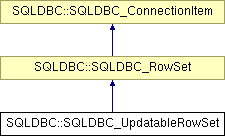
Inheritance diagram for SQLDBC::SQLDBC_UpdatableRowSet:

A SQLDBC updatable row set offers update, insert and delete operations on the underlying result set.
The insertAllRows() and insertOneRow() methods allow inserting either a whole row set or a single row (the first one) of the row set into the parent result set. The method updateRow() updates an arbitrary row of the result set while the method deleteRow() deletes a single row on a given position. The method insertRow() does insert a single row by using the data at the given position.
If the position supplied to insertRow(), updateRow(), or deleteRow() is zero, the insert/update/delete operation is executed for the whole row set.
Definition at line 1222 of file SQLDBC.h.
|
|
Deletes the error has been stored.
|
|
|
Deletes the warning stored in the SQLWarning object.
|
|
|
|
|
|
Deletes a single row of the row set at a given position.
|
|
|
Returns a reference to the ErrorHndl object.
|
|
|
Writes the retrieved data to the bound columns.
|
|
||||||||||||||||||||||||||||||||
|
Retrieves and converts the value with an start offset in of the specified column from a of the current row to a buffer. The specified column value in the current row of this SQLDBC_RowSet object is converted to the given length and SQLDBC_HostType and written to the output parameter buffer pointed to paramAddr. It can be called multiple times to retrieve character or binary data in parts. For fixed-length datatypes getObject retrieves the same data multiple times. Mixing variable-length datatypes and fixed-length datatypes may produce unexpected results. The current row may be set by a positioning command from SQLDBC_ResultSet (current row = 1) or by the setPos method of the SQLDBC_RowSet object.
|
|
||||||||||||||||||||||||||||
|
Retrieves and converts the value of the specified column of the current row to a buffer. The specified column value in the current row of this SQLDBC_RowSet object is converted to the given length and SQLDBC_HostType and written to the output parameter buffer pointed to paramAddr. It can be called multiple times to retrieve character or binary data in parts. For fixed-length datatypes getObject retrieves the same data multiple times. Mixing variable-length datatypes and fixed-length datatypes may produce unexpected results. The current row may be set by a positioning command from SQLDBC_ResultSet (current row = 1) or by the setPos method of the SQLDBC_RowSet object.
|
|
|
Returns the number of rows written to the bound parameters.
|
|
|
Returns the row status array for the last fetch call. The row status array describes the state of each row. The maximum size of the row status array is given by the setRowSetSize(). The row status array is filled during the fetch() call. The return code of the first row matches to the first member of the row status array.
|
|
|
Performs a mass insert of the whole row set into the result set.
|
|
|
Performs a single insert of the first row of the row set into the result set.
|
|
|
Performs a single insert of the first row of the row set into the result set.
|
|
||||||||||||
|
Switches to the next input parameter if the application uses data at execute parameters. After calling this member function, the paramIndex and the paramAddr parameters are set.
|
|
||||||||||||
|
Switches to the input parameter if the application uses data at execute parameters,. After calling this member function, the paramIndex and the paramAddr parameters are set. The paramIndex parameter is used to select the next parameter that is processed. You cannot process parameters that are bound to LOB columns before all parameters that are bound to non-LOB columns have been processed for a row.
|
|
||||||||||||
|
Put data for an input parameter.
|
|
|
Sets the cursor to row pos in the SQLDBC_RowSet.
|
|
|
|
|
|
Updates a single row with the values of the first row of the row set at a given position.
|
|
|
Returns a reference to an SQLWarning object stored in the SQLDBC_ConnectionItem object.
|